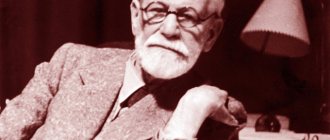Updated July 21, 2021 136 Author: Dmitry Petrov
Hello, dear readers of the KtoNaNovenkogo.ru blog. Existentialism is usually associated with a gloomy worldview: life is decay, there is no meaning in it, a person is tragically alone.
Existential philosophy reflected and determined the mood of the 20th century in the West, when humanistic ideas about the greatness of man were greatly shaken.
Two world wars, the invention of weapons of mass destruction, scientific and technological progress that turns daring fantastic ideas into reality - all this became a trigger for the existential perception of life.
Basic principles of existentialism
Being is genuine and inauthentic. Existentialism takes a special look at human life and destiny. First of all, adherents of this doctrine believe that human existence does not depend on our will: We do not choose where we are born, into what family, what color hair or eyes, what size and health we will have. Moreover, our existence is determined by certain social norms. For example, a person born in Russia today is practically “doomed” to learn to walk, read and speak Russian; he must live and communicate with the society of people.
Because of all this certainty that does not depend on a person, existentialists call his existence (or being) inauthentic.
Existentialist theory views freedom and all its manifestations as a true existence that everyone should strive for one way or another.
However, obtaining this desired freedom is not so easy. It is believed that a person can understand his existence only in a critical, borderline situation. This opinion stems from the fact that in stressful situations a person’s emotions intensify, his nerves become tense, and emotions overwhelm us. A person is able to do things that he would never dare to do under normal conditions, overcoming the limits of his physical and mental abilities.
Since existence cannot be known through the mind, but is explored only through sense perception, the moment the instruments of this perception are heated to the limit, man is able to realize his nature and his destiny in this world.
Existentialism through the eyes of ordinary people
There are many home-grown and certified philosophers on the Internet. It would be interesting to hear their opinions:
- Existentialism is a philosophical concept; it is not so easy to explain in simple words. This is such a personal feeling of a person when he seems to look and evaluate himself from the outside. Understanding the temporary nature of his own existence, he still does not regret his stay on this earth. These sensations can be temporary; some people are able to experience them only in the face of a mortal threat or immediately before death.
- Existentiality is, in simple words, when a person does not blame nature, circumstances or other factors for his actions. Every choice is an act of free will; it is free will and responsibility that have become the subject of consideration in philosophy.
Man and self-knowledge
Since the essence of a person can be genuine and insincere, there are some rules and guidelines that help a person to approach the right way of life and understand his existentiality.
However, first of all, it is worth mentioning the obstacles that a person faces along this path. Existentialists believe that one of the factors that predetermines the fate and life of a person is his insufficiency. A person always depends on something. Sometimes on another person (boss, breadwinner or lover), sometimes on a group of people or the state.
The religious branch of existentialism emphasizes man's dependence on God and religion, on these moral and ethical principles. Many philosophers have attributed to God the ability to have unlimited control over human life and destiny and to dispose of it according to His supreme discretion. Some believed that although a person depends on God, can make some life decisions on his own, make some decisions within the framework of what is permissible, he still, in fact, depends on God and higher powers.
The atheistic branch, on the other hand, attributes to man a thirst for power, a desire to suppress the freedom of another or to ease the suppression of his own freedom. Philosophers in this field believed that each of us, motivated by fear for our lives and the desire to protect ourselves, strives to occupy the most advantageous position in society. Typically this position has some power. A person in a position of power enjoys greater privileges and protection than other people. This makes his life safer and more comfortable. To achieve this goal, each person strives to climb higher on the social ladder. In this desire for social progress, existentialist philosophers of the atheistic branch see the main reason for human slavery in the world.
Existentialists have a special view of the existence of animals. In their opinion, animals are inseparable from their existence, because they do not need to know it, it is already known to them. This is because animals do not have rational thought, do not "get in the way" of them, and do not separate them from their sensory perceived being. Animals do not need to sharpen their senses, try to make them more subtle and sensitive, they already feel the world as it really is, and are aware of all its unique complexity and beauty.
However, existentialists believed that there were ways in which people could understand and approach their existence.
Existentialists considered feelings to be the most important way of knowing oneself, and therefore intuition can be called the most important “weapon” for knowing one’s existence. Each of us must develop it and strive for its complete mastery. Intuition as “the touch of sensory cognition in rational cognition” can help us understand the entire essence of our being, unravel all its secrets and riddles and, merging into a single whole with our existence, feel all the beauty of the world in which we live.
In existentialism, it is believed that intensification of feelings occurs in a critical, extreme situation. For this reason, a person should not avoid unpleasant stressful situations. He can extract important new information from them and make interesting conclusions and discoveries. Living through an ambiguous, borderline situation, a person receives new ideas and thoughts and comes closer to understanding his existence and the world as a whole.
Existential human problems
The desire for self-development is a natural survival mechanism, since without it the human race would never have reached the current level of development. The problem is the obstacles that lie in wait on this path; one of the obstacles is often an existential crisis, formed from contradictions within the individual. A neurosis-like state appears when there is no need to worry about the minimal needs of existence.
The desire to argue for their own existence appears in most subjects, but for some, the arguments turn out to be primitive and complex due to deep religiosity or embedded “instructions” of a different order.
Existential problems arise at the moment of disappointment in previously chosen ideals. The individual ceases to feel satisfaction from the growth of status or loses faith in the unprecedented value of his own existence. Another reason for such experiences may be a feeling of the inevitability of death.
Sometimes it may seem as if such thoughts only come to the minds of those with a lot of free time, since hard-working individuals need to solve many pressing problems every day and all their strength goes towards survival.
In part, this view is correct, since subjects of creative professions are more likely to have existential reflections; individuals engaged in physical activity are less predisposed to delving into the “sidelines” of their own personality, however, they are not completely protected from this.
The following prerequisites for the emergence of existential experience can be identified:
– loss of a loved one;
– use of psychedelics;
– a threat to one’s own existence;
– prolonged isolation;
– separation from children, loved ones.
In the course of existential reflection, the individual has to face the confrontation generated by the feeling of the significance of his own existence and the simultaneous understanding of its futility. The inability to find a solution to the current situation is transformed into existential despondency, which is characterized by a loss of interest in one’s own future.
The escalation of a crisis often provokes a desire to end one’s supposedly meaningless existence. Because it doesn't seem to be able to do any good. When an individual is faced with such a contradiction, it is incredibly difficult for him to resolve the problematic situation on his own.
Anxiety in existentialism
Anxiety, as part of sensory cognition, has a special place in existentialism.
At first glance, anxiety may not have deep philosophical meaning, but it was the existentialists who studied it in detail and came to the conclusion that anxiety is something much deeper than the simple sensation of being touched by external stimuli.
First of all, philosophers of this school of thought distinguish between anxiety and fear. Fear refers to emotions that have a specific cause. A person always knows what he is afraid of, and therefore can find ways to deal with this fear and get rid of it.
On the other hand, fear is considered by philosophers as a feeling that does not have a specific object. A person can never say what he is afraid of, the reason is hidden somewhere deep in his subconscious, it exists only at the level of feelings and does not control a person. Fear is a category of irrational knowledge that brings us closer to an existential being and unmistakably convinces us of the fundamental nature of existence.
Existentialists believe that fear has a positive effect on a person. According to them, the feeling of fear helps us go beyond the ordinary, look at ourselves and the world from a different point of view, and notice what was previously unknown. Fear is part of freedom, a method of recognizing and achieving it, because it separates us from our usual view of the world.
Pronunciation and meaning of the word "existential"
For the Russian language, the word existentialism is an unpronounceable tongue twister. Many people pronounce it incorrectly, adding an extra syllable - “existentialism”. To correctly use all forms of this word, you need to understand its origin.
Existentialism is derived from the Latin word existence (existentia) - existence.
The difficulty is that there is no synonym for it in the Russian language, so in the simplest words, existentialism is a philosophy of existence, and existential is related to existence.
The history of existentialism
Speaking about any philosophical doctrine, it is equally important to mention the history of its origin and development, as well as name the reasons that gave people of that time a reason to perceive the world and man in this way and not otherwise.
The philosophy of existentialism emerged after the First World War. It was especially important for people of that time to understand who they were and why they were alive. Many were constantly afraid and did not believe in the future. Based on all these experiences and moods, the theory of existentialism was born, which did not call for the fight against anxiety and stress, but praised and illuminated them from a new, absolutely incredible side.
Moreover, for the first time in philosophical teaching, existentialists posed a new problem of the existence and fate of man. They gave a clear and understandable answer to the question of how we can conceive life, what we should do, how to understand the world on which we all depend. No philosophical school has ever so widely covered the question of human destiny.
It is currently believed that S. Kierkegaard laid the foundations of this doctrine. This philosopher argued that it is impossible to comprehend existence through rational knowledge.
First of all, Kierkegaard was against Hegel’s system as a complete, complete, closed structure, and rightly believed that “a system of being is impossible”….. System and completeness are intertwined with each other; being is the complete opposite of this." Hegel, like all German classical philosophy, wanted to create a philosophical science whose ideal would be objectivity. All subjective, personal things were considered untrue. In contrast, Kierkegaard places the personality (subjective), which has a real, true existence, at the center of philosophical interest. This person is a concrete, spiritual person - “special”, as the philosopher calls it - only he has “being”.
Existence, Dasein is understood as human existence and is the central category of the doctrine created by the Danish thinker. It captures the existence of a person's inner and unique experience. Existence, according to Kierkegaard, is the awareness of one's being, freely choosing one of the alternatives. Thanks to this choice, a person asserts his uniqueness, his individuality.
Not all of Kierkegaard's ideas were accepted by the existentialists, but many of them became the basis of the doctrine, were revised and received a new form.
The existential idea of bondage, dependence and human imperfection, for example, stems largely from Kierkegaard's thoughts on despair. Departing from the Christian dogma of original sin, this philosopher basically defines human life as despair. At the same time, in his opinion, despair is a means of turning a person to God. A person who freely chooses solitude and approaches God is a true believer.
Along with the idea of despair, Kierkegaard viewed fear as a special category of meaning for each of us. He believed that anxiety stems from a person's awareness of the brevity of his own life and the inevitability of death. A person cannot do anything to increase his own life, which creates a feeling of fear in him, including fear of the unknown.
Kierkegaard developed the philosophy of existentialism and contrasted it with German classical idealism. He believed, contrary to popular belief at that time, that the world and human nature should be known primarily through the senses, since the whole meaning of existence was irrational.
By and large, Kierkegaard belonged to the religious branch of existentialism, but some of his ideas gave rise to the development of the atheistic branch of the doctrine. Existentialist philosophers consider Kierkegaard their forerunner because he was the first to put forward the idea that human existence is irrational.
Why are we experiencing an existential crisis?
Most often this happens when we begin to reflect on our purpose in life. Due to regular routines and monotonous work environment, we become dissatisfied with our lives and start wondering why we keep working so much? Where is all this going? What do I get out of life after all this work?
This raises many significant and profound questions, such as:
- What is life? – What is my goal? – Why do I exist?
Existential thoughts begin to arise and the person ponders all sorts of personal questions.
What is a sense of life? Why live on? These thoughts can be explained by Maslow's hierarchy of needs.
Abraham Maslow's hierarchy explains that people are driven by five basic needs. These are psychology, safety, love, respect and self-realization. In the last part, self-actualization is the existential crisis part of discovering your purpose.
Signs You're Currently Experiencing an Existential Crisis
Unfortunately, experiencing an existential crisis can bring up unpleasant feelings. This can make you feel lost and depressed. Your general mood becomes melancholic.
People experiencing an existential crisis feel like they no longer know who they are. They feel powerless and struggle to find motivation. It became a global phenomenon involving record numbers of people.
You feel empty
This can often come from feeling unimportant. The universe is so big that it's easy to feel small.
This creates insecurity within us. When we are born and experience the world at a young age, we enjoy the pleasures and adventures that the universe has to offer.
We just love to climb trees and run through fields.
It's only when we get older and take on responsibility that we begin to question everything.
Learning to cope with the experience of an existential crisis will ultimately help us grow, but for now it is very difficult.
We stop having fun and become more objective about how we spend our time and how we fit into the world.
You feel powerless
When we are young, there is a feeling that the Universe is always working for us, and not against us. The Universe is our friend and mentor.
As we get older, we face new challenges and financial responsibilities, and life becomes more complex. There is more pressure from society and from people to do something with our lives.
The playful relationship with the universe has ended and it begins to seem like it is working against us. We begin to feel that something is being imposed on us. Other people now control our time and our lives.
This makes us feel a strong sense of powerlessness. It's no longer about the entertainment, but how we fit into the experience.
Is all this really worth it? Many people going through an existential crisis don’t feel like this is the case.
You feel completely different from others
Some people do not suffer from existential thinking and can easily live their lives. No matter what they are going through, they can easily focus on their tasks.
However, when you are in the midst of an existential crisis, it takes over your entire life. You constantly feel different. You constantly ponder the existence and immensity of everything.
Because it is such a difficult experience, you are left with a constant feeling of emptiness and powerlessness. It becomes part of your daily emotional makeup. You always feel completely different from others.
4. Your past achievements seem meaningless.
Experiencing a real threat tends to put your life in quite a harsh perspective.
In the grand scheme of the Universe, any big things we achieve in our lives tend to become insignificant and small.
We think, “What did I really do that made a difference in the world?” Many people think so. However, those experiencing an existential crisis feel even worse because they see less meaning in everything.
The problem is that we compare our achievements to the greatness of the Universe. How can you compete with something incomprehensible?
General properties and connections
The category in Greek means “accusation”, “trial”, “denunciation”, revealing the essence in its true form. Categories are “naming words” that denote the essence of a thing. The category is understood by M. Heidegger as a defining name in which the essence is revealed in its true being. This explanatory definition of being appears as a defining “silent name.” This conceptual nature, in turn, is unexplored and is present in all the sayings with which we are familiar. If the categories are not expressed in sayings, then they carry with them every saying, therefore, there is a basis for every judgment.
M. Heidegger is a representative of existentialist philosophy of the mid-20th century. He was one of the "spiritual gurus" of National Socialist ideology in Germany. It was he who introduced the concept of “existential”.
The existential and categorical are recognized by the philosopher as two fundamental units of ontology, on the basis of which the ability to form two possible types is realized: on the basis of existential-phenomenological analysis and categorical analysis.
The existential is a specific alternative to the category, just as the category is an alternative to the existential. However, they are comparable in the basic outline of their being.
Heidegger's concept of presence
Presence, “dasein,” is a special way of being that occurs through understanding the relationship to one’s being and to oneself. The concept of presence is directly determined by the logos of being. In this relationship between presence and being, presence is a kind of disembodiment. In this openness, presence itself will be open, so it should be understood that in the openness of presence, being as such is open.
Thus, openness is a special kind of being, an elementary interpretation of presence.
The philosopher does not make a categorical distinction between the phenomenal and the existential, so we can only regard them as two extremes of the same being.











